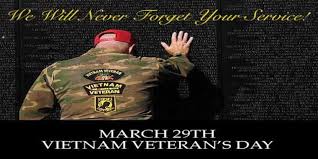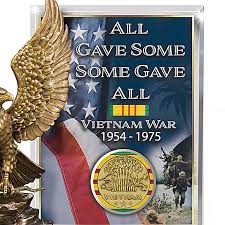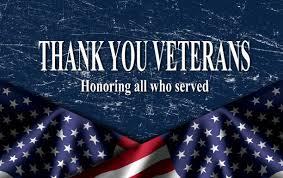Each year, on March 29th, the United States observes Vietnam Veterans Day, a day set aside to honor and recognize the brave men and women who served in the Vietnam War. This day holds deep significance, as it provides an opportunity to pay tribute to the sacrifices of veterans who faced the hardships of war and the challenges of returning to a nation that was divided in its opinions on the conflict. Vietnam Veterans Day serves as a reminder of the courage, resilience, and dedication of those who answered the call of duty during one of the most tumultuous periods in American history.
A Brief History of Vietnam Veterans Day
Vietnam Veterans Day was officially recognized as a national observance in 2012, when President Barack Obama signed a proclamation designating March 29 as a day of remembrance. The date was carefully chosen because it marks the day in 1973 when the last U.S. combat troops withdrew from Vietnam, a moment in history that symbolizes the end of American involvement in the war.
The Vietnam War, which lasted from 1955 to 1975, remains one of the longest and most controversial wars in American history. Over 2.7 million American men and women served in Vietnam during this time, and more than 58,000 of them lost their lives. Thousands of others were injured, many suffering from long-term physical and psychological wounds. Yet, when these veterans returned home, they were met with an often hostile or indifferent reception. The anti-war sentiment that was prevalent in the United States during and after the war made it difficult for veterans to reintegrate into civilian life and be recognized for their service.
For years, there was no dedicated day of recognition for Vietnam veterans. It wasn’t until the Vietnam War Memorial was unveiled in Washington, D.C., in 1982, that the American public began to acknowledge the sacrifices of these veterans more fully. However, the veterans still faced challenges being truly honored and respected for their service. Therefore, the creation of Vietnam Veterans Day was an essential step toward healing and national reconciliation.

Significance of Vietnam Veterans Day
Vietnam Veterans Day is more than just a symbolic day of remembrance. It is an opportunity to show gratitude and respect to those who served in the Vietnam War, acknowledging their courage and dedication to their country. It is a day for the nation to reflect on the problematic experiences these veterans endured and the sacrifices they made, whether on the battlefield or in their personal lives after returning home.
The observance of this day also brings attention to the continuing needs of veterans. Many Vietnam veterans continue to face physical and mental health challenges, including post-traumatic stress disorder (PTSD), agent orange-related illnesses, and other chronic conditions. Vietnam Veterans Day reminds us that these men and women deserve ongoing support and care through healthcare services, educational benefits, job opportunities, or recognition of their struggles and triumphs.
Another critical aspect of Vietnam Veterans Day is its role in educating the public about the Vietnam War. Many Americans today were born after the conflict ended, and as a result, they may not fully understand the complexities of the war or the experiences of those who fought in it. Vietnam Veterans Day allows younger generations to learn about the war, its impact on American society, and the lives of those who served.
The day is also about healing and honoring the memories of the fallen. For many families, it is an opportunity to remember loved ones who did not return from Vietnam. It is a time to share stories of courage, loss, and resilience, and to ensure that the sacrifices made by these men and women are never forgotten.

How to Observe Vietnam Veterans Day
Individuals and communities can observe Vietnam Veterans Day in several ways. Many cities nationwide hold ceremonies and events to honor veterans, often including speeches, patriotic music, and moments of silence. These events may take place at local Veterans Affairs (VA) facilities, community centers, or other public venues. Many veterans’ organizations, such as the Vietnam Veterans of America (VVA), also host events to celebrate the contributions of their members and raise awareness about the issues facing Vietnam veterans.
Another meaningful way to observe the day is to express gratitude to a Vietnam veteran. This could be as simple as a phone call, a letter, or a visit. Knowing that the community appreciates their service can be significant for many veterans, especially if they were not recognized or thanked when they first returned home from the war.
Teachers and administrators in schools and educational institutions can use the opportunity to teach students about the Vietnam War, the experiences of veterans, and the historical significance of the conflict. Educational programs and guest speakers from the veteran community can help foster understanding and respect for this important chapter in American history.
The Legacy of Vietnam Veterans
As we observe Vietnam Veterans Day each year, it’s important to remember that the legacy of these veterans extends beyond the war itself. The Vietnam War and its aftermath shaped American society in profound ways, from the civil rights movement to the development of modern military strategy and veterans’ care. The sacrifices made by these veterans continue to influence the way we view and treat those who serve in the armed forces today.
Vietnam veterans also played a crucial role in reshaping how the nation treats its military personnel. The difficulties they faced upon returning home and the challenges they overcame helped pave the way for greater recognition and respect for veterans of subsequent conflicts, such as those from the Gulf War, Iraq, and Afghanistan. Today, Vietnam veterans stand as a symbol of resilience and perseverance, demonstrating the importance of honoring those who serve and ensuring their contributions are never forgotten.

Conclusion
Vietnam Veterans Day is a day of remembrance, honor, and healing. It is a day to recognize the sacrifices made by millions of Americans who served in the Vietnam War, to acknowledge the pain and challenges they endured, and to express gratitude for their service. It is a day to learn, reflect, and support the ongoing needs of veterans. Most importantly, it is a day to ensure that the legacy of Vietnam veterans remains integral to our national consciousness, reminding us of the importance of honoring those who serve our country.
